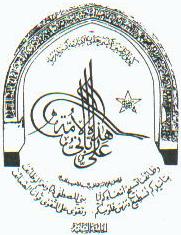AL JAMEA TUS SAIFIYAH

This Arabic academy in Surat, India, is the principal institution for the religious education and training of the Dawoodi Bohras. The academy was established in 1814 by the 43rd Dai Al Mutlaq, Syedna Abdeali Saifuddin (R.A) (1798-1817). The institution was then known as Dars Al Saifie, in which the Dai’s and their learned disciples conducted sessions in the mosque or courtyard "IWAN" of the academy, disseminating authoritative knowledge on Fatimid Ismaili thought. Even then the academy had promoted a system of education that remains its hallmark to this day. This is to view all knowledge, religious and otherwise, as essentially part of broader Islamic knowledge and to require contemporary subjects to be thought harmoniously with Islamic lore. Sectarians regard this to be a Fatimid practice and thus part of their heritage.
During the leadership of the 51st Dai, Syedna Taher Saifuddin (R.A), the academy was given its present name, and changes were introduced to make the traditional religious knowledge accessible to contemporary believers. Without changing the content core subjects were taught using modern educational methods. Contemporary subjects were reinstituted and taught in English; where as Arabic remained the foundation of traditional learning. Arabic as the arabicized form of the Indian Language Gujarati serve as the media for religious discourse within the academy. A building program was also initiated which simultaneously improved facilities and introduced Fatimid Architecture in to the campus. The current Dai Syedna Mohammed Burhanuddin (TUS) has continued his predecessors work and completed the modernization and building program. Modern felicities such as language laboratory for the technique of quranic sciences have been provided, and the architecture now reflects the Fatimid origins of the academy.
A new branch of academy was also built by him in Karachi, Pakistan, in 1983. These improvements were implemented by the academy’s eminent rector Sayiidi Yusuf Bhai Saab Najmuddin, to whom the academy’s current academic and administrative policies may be attributed.
Al Jamea Tus Saifiyah houses some of the most rare Islamic manuscripts of the Fatimid and Yemenite period. These priceless manuscripts are zealously preserved by the academy; recently attempts have been made to publish edited versions of some of them.
One of the distinctive features of the academy is its system of examination, which tests the qualification of advanced students in a public gathering of academics, community leaders, and general members presided over by the Dai. The system helps to confirm the credentials of future religious guides in the presence of the community and its leader and also helps to access the method of instruction.
The Academy is essentially a residential campus, with boarding and lodging provided free to both male and female students by the Dai. It was one of the world’s first theological institutes to enroll female students. Islamic mores requiring separation of men and women in living quarters and in classrooms are observed strictly.
The academic programs at the Jamea lasts for eleven years and is divided into three stages. The first four years with the student being at the age of twelve are spent in foundational studies designed to equalize the preparation of students from differing educational backgrounds. The subject taught includes Arabic poetry and prose, jurisprudence, Islamic history, Islamic religious practice, English, Humanities, Social sciences, and natural Sciences. Arabic is taught by usage rather than by formal instruction. The student is required to memorize a great deal of Arabic poetry, a practice that has made the Bohra community rich. The student is also evaluated for religious practice and piety. A diploma mubtagi al ilm (seeker of knowledge) is awarded on the successful completion of this stage. Over the next five years the same subjects are developed further, but in addition psychology, philosophy, and subjects peculiar to Fatimid Ismaili Tayyibi Shiism are taught. At the end of this stage a degree called faqih al mutqin (Perfect Jurist) is awarded. The last two years are reserved for the graduate work, in which the student specializes in specific subjects such as, Arabic literature, Islamic jurisprudence, and Islamic history. The graduate of this stage is awarded the degree of faqih al jayyid (Accomplished Jurist). Karachi University recognizes this degree as equivalent to a Masters of Arts.
While in training, students are given the opportunity to obtain practical experience by being sent to different towns to lead local communities during Ramazan and Moharrum. About forty students complete the full eleven years, out of an annual intake of about a hundred in both branches of the academy. Most graduates are appointed as religious guides to serve the community wherever the Dai dispatch them, although some choose independent careers.
Taken From: THE OXFORD ENCYCLOPEDIA OF THE
Modern Islamic World